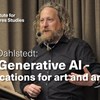generating

Ghost Platform: Generating the "Complex Image" of Data, Labour, and Logistics
This project aims to create a platform that makes visible the conflicts in transport logistics that are mostly being concealed from public view.

Big generative AI - Implications for creativity, art, and artists
Research seminar with Palle Dahlstedt, Professor in Interaction Design at Gothenburg University. In this lecture, Palle Dahlstedt will share a pragmatic, critical, and visionary view of what machine l
Palle Dahlstedt: Big generative AI - Implications for creativity, art, and artists
Date & Time: Wednesday, June 12 at 10:00-11:45 (CET)Venue: Institutet för framtidsstudier, Holländargatan 13, 4th floor, Stockholm, or online. Research seminar with Palle Dahlstedt, Professor in In
Modelling Social Mechanisms for Knowledge Generation & Exploration
Nanda Wijermans, Stockholm Resilience Centre Human behaviour is a complex phenomenon with a lot of open questions. Computational modelling can support the scientific quest for more understanding of hum
Inherited Trust and the Economic Success of Second Generation Immigrants
Martin Ljunge, Institutet för Näringslivsforskning (IFN) ABSTRACTThe paper that will be presented finds significant private returns from trust. Individuals with high trust earn more. Greater trust lead

Future generations
Climate change is the biggest challenge of our time, and in this theme there is a focus on future generations and their living conditions. We aim to examine among other things climate ethics, sustainable development, green growth, obstacles to climate action and social dilemmas.
Discrimination and Future Generations
In: Mosquera, J. & O. Torpman (ed.),Studies on Climate Ethics and Future Generations vol. 6. Working Paper Series 2024:10–17 Abstract In this paper, I analyse whether the present generation’s choices. This has been tentatively suggested in both legal theory and philosophy; I review such suggestions briefly in section 1. However, a more rigorous analysis – outlining the concept, relevant grounds, and wrong-making features of discrimination, and applying these to future generations – is still lacking. To address this lacuna, I propose a theory of discrimination and analyse why it might seem to apply – yet ultimately fails to apply – to the differential treatment of future generations. More specifically, I propose a definition of discrimination (section 2.1) and an account of the moral wrongness of discrimination (section 2.2). I moreover explore the connection between discrimination and theories of social (in)justice (section 2.3). I then apply this theory to the problem of differential treatment of future generations. While discrimination may occur between collectives, such as generations (section 3.1), my analysis shows that the specific temporal status of future generations is not comparable to other grounds of discrimination, such as gender or race (section 3.2). Moreover, due the non-identity problem and the problem of lack of a “community of social meaning” between generations, future generations cannot be claimed to be subjected to worse treatment by the present generation (section 3.3). Hence, their differential treatment due to the present generation’s choices does not amount to discrimination. Section 4 concludes and outlines some upshots of my analysis.

A welfare state for all generations
In a society there are always several generations co-existing and they all need different things from the welfare state. This result is a conflict between generations on who should be favored by publi by , Tommy Ferrarini, Kenneth Nelson and Joakim Palme.

Climate Change and Future Generations
What we do - or fail to do - about climate change now will impact the lives of billions and billions of people in the future. What is the right thing to do? This animated short film highlights the cho
Constructivist Contractualism and Future Generations
In The Oxford Handbook of Intergenerational Ethics, Stephen M. Gardiner (ed.), s. C36.S1 - C36.N20. Abstract In constructivist contractualist theories, such as Rawls’, principles of justice should mirror








